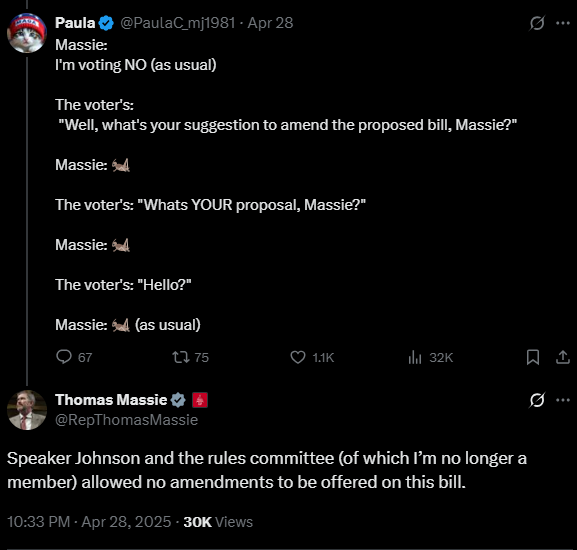Congress Overwhelmingly Passes "Take It Down Act" Orwellian Censorship Bill To Target Sensitive Content And Remove Criticism Of Trump From The Internet
It’s always about protecting the children isn’t it?
This week a bipartisan House of Representatives overwhelmingly passed the “Tools to Address Known Exploitation by Immobilizing Technological Deepfakes on Websites and Networks Act” (better known as the “TAKE IT DOWN Act”) that would force social media companies to remove certain AI content such as pornography and deepfakes. But critics have warned that the bill does more than just that and could be used to suppress criticism of the President and the administration’s policies.
According to a summary of the bill on Congress.gov:
This bill generally prohibits the nonconsensual online publication of intimate visual depictions of individuals, both authentic and computer-generated, and requires certain online platforms to promptly remove such depictions upon receiving notice of their existence.
Specifically, the bill prohibits the online publication of intimate visual depictions of
an adult subject where publication is intended to cause or does cause harm to the subject, and where the depiction was published without the subject’s consent or, in the case of an authentic depiction, was created or obtained under circumstances where the adult had a reasonable expectation of privacy; or
a minor subject where publication is intended to abuse or harass the minor or to arouse or gratify the sexual desire of any person.
Violators are subject to mandatory restitution and criminal penalties, including prison, a fine, or both. Threats to publish intimate visual depictions of a subject are similarly prohibited under the bill and subject to criminal penalties.
Separately, covered platforms must establish a process through which subjects of intimate visual depictions may notify the platform of the existence of, and request removal of, an intimate visual depiction including the subject that was published without the subject’s consent. Covered platforms must remove such depictions within 48 hours of notification. Under the bill, covered platforms are defined as public websites, online services, or applications that primarily provide a forum for user-generated content.
The Take It Down Act was introduced by Senator Ted Cruz (R-TX) in June 2024 and reintroduced in January, just a few days before President Trump’s inauguration, and had a number of bipartisan co-sponsors. The bill unanimously passed the Senate in February.
The bill passed the House on April 28th with almost unanimous support across both party lines, save only for Eric Burlison (R-MO) and Thomas Massie (R-KY) who dissented. The bill now awaits Trump’s signature.
The bill was initially tapped as a way to force online platforms to remove nonconsensual intimate images, including sexually explicit deepfakes and so-called “revenge porn,” The 19th* News noted.
The bill was championed by First Lady Melania Trump held a roundtable event at the White House on March 15th to garner support for the bill. She also brought 15-year-old Elliston Berry, a victim of deepfake abuse who has been seeking for the bill’s passage.
However, privacy advocates are worried that while the Act is well-intentioned, it is far too vague and can be used to take down content far beyond illicit AI content, but is a way for the government to silence criticism and dissent, and harm encrypted communication.
The Electronic Frontier Foundation (EFF) warned in February that the bill’s lack of safeguards and broad definitions “will likely lead to people misusing the notice-and-takedown system to remove lawful speech.” The group points out that this bill “creates a far broader internet censorship regime than the Digital Millennium Copyright Act (DMCA),” which has been regularly abused on social media platforms to get content removed without justifiable reason, though DMCA still has anti-abuse provisions to protect against false copyright claims.
The takedown provision applies to a much broader category of content—potentially any images involving intimate or sexual content—than the narrower [non-consensual intimate imagery] NCII definitions found elsewhere in the bill. The takedown provision also lacks critical safeguards against frivolous or bad-faith takedown requests. Lawful content—including satire, journalism, and political speech—could be wrongly censored.
The legislation’s tight time frame requires that apps and websites remove content within 48 hours, meaning that online service providers, particularly smaller ones, will have to comply so quickly to avoid legal risk that they won’t be able to verify claims. Instead, automated filters will be used to catch duplicates, but these systems are infamous for flagging legal content, from fair-use commentary to news reporting.
The bill’s opaque wording also calls into question encryption protection. While the bill does exempt email providers to comply, it fails to lay out specific exemptions for private messaging apps, cloud storage, and other end-to-end encrypted (E2EE) services. The EFF questions whether this will then lead to apps ditching E2EE all together to allow content to be monitored, and also points out that many NCII victims rely on it for protection.
Internet Society penned a letter to Congress in early-April urging them to reconsider the wording in the bill, specifically in regard to the lack of guidance for encryption. “The consequences are severe: it could be impossible for providers of encrypted services to comply with the Act’s obligations without breaking encryption and introducing systemic security flaws,” the group wrote on the behest of a number of internet advocacy groups.
These concerns were heightened when President Trump joked during the State of the Union Address in March that he would personally use the legislature to remove criticism and malicious imagery of him online.
“With Elliston’s help, the Senate just passed the Take It Down Act. And this is so important. […] And thank you to John Thune and the Senate. Great job to criminalize the publication of such images online. It’s terrible… terrible thing. And once it passes the House, I look forward to signing that bill into law. Thank you.
“And I’m gonna use that bill for myself too, if you don’t mind. ‘Cause nobody gets treated worse than I do online—nobody. That’s great. Thank you very much to the Senate. Thank you.”
EFF noted: Trump has frequently targeted platforms carrying content and speakers of entirely legal speech that is critical of him, both as an elected official and as a private citizen. He has filed frivolous lawsuits against media defendants which threaten to silence critics and draw scarce resources away from important reporting work.
In February, an AI-generated video of Trump kissing Elon Musk’s feet went viral and was even displayed across White House television monitors in a prank.
More recently, in response to the President’s trade war, Chinese residents have created AI videos of Trump and other figures such as VP JD Vance and Elon Musk, along with obese Americans working in sweatshops and performing menial labor.
But Trump himself has liked and shared AI videos of himself, one including an AI-voiceover that equated Trump with Jesus Christ, and in February when he shared an obscure AI video featuring himself, Musk and Israeli Prime Minister Benjamin Netanyahu partying in a rebuilt Gaza as the so-called “Riviera of the Middle East.” Thus, it may stand to reason that AI content praising Trump will be acceptable, if Trump is serious about using the Take It Down Act to silence detractors.
Massie, one of two Representatives who voted ‘nay’, said in a post on X: "I’m voting NO because I feel this is a slippery slope, ripe for abuse, with unintended consequences," along with snapshots from a Washington Post article that pointed out the problems with the bill. In response to criticism, Massie remarked that “Speaker Johnson and the rules committee (of which I’m no longer a member) allowed no amendments to be offered on this bill,” but did not explicitly list the reasons he opposed the bill.
In short, EFF commented on the bill’s passage warning:
Congress is using the wrong approach to helping people whose intimate images are shared without their consent. TAKE IT DOWN pressures platforms to actively monitor speech, including speech that is presently encrypted. The law thus presents a huge threat to security and privacy online. While the bill is meant to address a serious problem, good intentions alone are not enough to make good policy. Lawmakers should be strengthening and enforcing existing legal protections for victims, rather than inventing new takedown regimes that are ripe for abuse.
AUTHOR COMMENTARY
It’s always about protecting the children isn’t it?
Per usual, while no one is hardly watching and the media is misdirecting your attention away elsewhere, the government passes a bill that on the surface sounds good - but nope! Instead, what we are getting is another Orwellian overreach bill that, if Trump abuses it like he said he would, means any criticism in the form of memes or short videos could be taken down; and if Trump can take something down at his own volition, you know the whole of government will abuse it as well, as will the diehard fanbase and trolls; not to mention that encryption is now limbo as well.
And then you have to wonder how far that will extend beyond just poking fun at Trump: will criticism of his policies be subject to disownment and censorship as well? We don’t know because the bill is so vague.
So there you have it: “King Trump”; bend the knee and kiss his ring, don’t criticize or question, only obey. Only “right think” is permitted.
Ecclesiastes 10:20 Curse not the king, no not in thy thought; and curse not the rich in thy bedchamber: for a bird of the air shall carry the voice, and that which hath wings shall tell the matter.
[7] Who goeth a warfare any time at his own charges? who planteth a vineyard, and eateth not of the fruit thereof? or who feedeth a flock, and eateth not of the milk of the flock? [8] Say I these things as a man? or saith not the law the same also? [9] For it is written in the law of Moses, Thou shalt not muzzle the mouth of the ox that treadeth out the corn. Doth God take care for oxen? [10] Or saith he it altogether for our sakes? For our sakes, no doubt, this is written: that he that ploweth should plow in hope; and that he that thresheth in hope should be partaker of his hope. (1 Corinthians 9:7-10).
The WinePress needs your support! If God has laid it on your heart to want to contribute, please prayerfully consider donating to this ministry. If you cannot gift a monetary donation, then please donate your fervent prayers to keep this ministry going! Thank you and may God bless you.









They already do this really…
Remember Hunter Biden Laptop? All them pictures? They were took down for same reason. Apple even came in and deleted pics of camera rolls.
Soon we will all be in a digital prison. Many will try and walk away. By then, it’ll be too late. We will be a nation of watchers, not doers.
If ya can't beat it: delete it. The theme of everything nowadays. erase truth, add false and make all to walk a tight rope. Remember when we didn't have computers; that was the best time and ya carried a quarter to call home if ya had to... I miss it, life wasn't complicated.
our hope is nothing less then Jesus' Blood and Righteousness and waiting for that Blessed Hope
fasten your seatbelts; our flight is about to take-off.